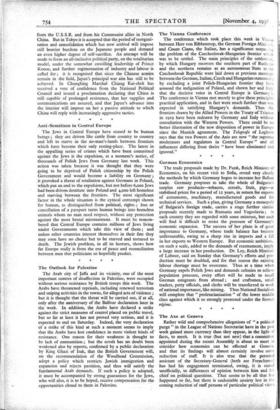The Vienna Conference The conference which took place this. week
in between Herr von Ribbentrop, the German Foreign Mini -, and Count Ciano, the Italian, has a significance surpa, the problem of the Czechoslovak-Hungarian frontier w • h was to be settled. The main principles of the settlemcit, by which Hungary recovers the southern part of Ruth, Li and the northern remains as an autonomous State in :he Czechoslovak Republic were laid down at previous meetings between the German, Italian, Czech and Hungarian statesmen ; by excluding a joint Polish-Hungarian frontier they ha% e aroused the indignation of Poland, and shown her and hale that the decisive voice in Central Europe is Germany'_. The conference in Vienna met merely to give these principles practical application, and in fact went much further than was expected in satisfying Hungary's demands. Thus the frontiers drawn by the Allied Powers in the Treaty of Trianon in 1919 have been redrawn by Germany and Italy without consultation with the Western Powers. There could be no better illustration of the new disposition of power in Europe since the Munich agreement: The Telegrafo of Leghorn says that the two Powers of the Axis are now " the supreme moderators and regulators in Central Europe " and all influences differing from theirs " have been eliminated and ignored."
* * * *










































 Previous page
Previous page